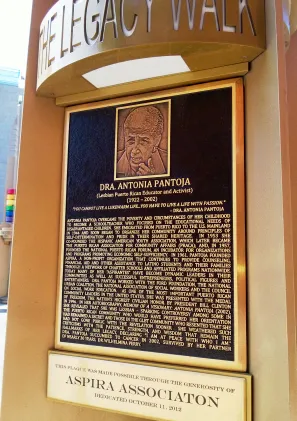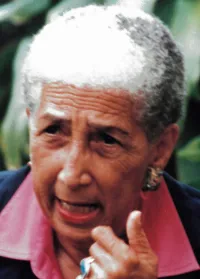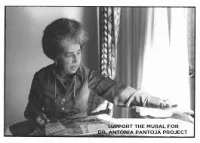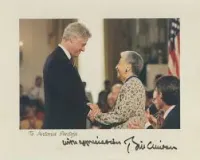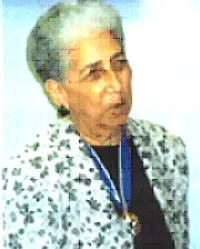Biography
1922 - 2002
"You cannot live a lukewarm life ... You have to live a life with passion."
- Dra. Antonia Pantoja
Antonia Pantoja overcame the poverty and circumstances of her childhood to become a schoolteacher who focused on the educational needs of disadvantaged children. She emigrated from Puerto Rico to the U.S. mainland in 1944 and soon began to organize her community around principles of self-determination and pride in their shared heritage. In 1953 she co-founded the Hispanic American Youth Association, which later became the Puerto Rican Association for Community Affairs (PRACA); and, in 1957, founded the National Puerto Rican Forum, an incubator for organizations and programs promoting economic self-sufficiency. In 1961, Pantoja founded ASPIRA, a non-profit organization that continues to provide counseling, financial aid and other assistance to Latino students and their families through a network of charter schools and affiliated programs nationwide. Today many of her “Aspirantes” have become dynamic leaders in their communities as well as successful entrepreneurs, political figures and entertainers. Dra. Pantoja worked with the Ford Foundation, the National Urban Coalition, the National Association of Social Workers and the Council on Social Work Education. As one of the most important Puerto Rican community leaders in the United States, she was presented with the Medal of Freedom, the nation's highest civilian honor, by President Bill Clinton in 1996. In her autobiography, Memoir of a Visionary: Antonia Pantoja (2002), she revealed that she was lesbian – sparking controversy among some in the Puerto Rican community who would have preferred her orientation had remained a secret and those in the GLBT community who resented that she had not gone public with the revelation sooner. She weathered such criticisms with the patience, strength, and wisdom that remain the hallmarks of her legacy, declaring “I am at peace with who I am.” Dra. Pantoja succumbed to cancer in 2002, survived by her partner of nearly 30 years, Dr. Wilhelmina Perry.
1922 - 2002
"You cannot live a lukewarm life ... You have to live a life with passion."
- Dra. Antonia Pantoja
Antonia Pantoja overcame the poverty and circumstances of her childhood to become a schoolteacher who focused on the educational needs of disadvantaged children. She emigrated from Puerto Rico to the U.S. mainland in 1944 and soon began to organize her community around principles of self-determination and pride in their shared heritage. In 1953 she co-founded the Hispanic American Youth Association, which later became the Puerto Rican Association for Community Affairs (PRACA); and, in 1957, founded the National Puerto Rican Forum, an incubator for organizations and programs promoting economic self-sufficiency. In 1961, Pantoja founded ASPIRA, a non-profit organization that continues to provide counseling, financial aid and other assistance to Latino students and their families through a network of charter schools and affiliated programs nationwide. Today many of her “Aspirantes” have become dynamic leaders in their communities as well as successful entrepreneurs, political figures and entertainers. Dra. Pantoja worked with the Ford Foundation, the National Urban Coalition, the National Association of Social Workers and the Council on Social Work Education. As one of the most important Puerto Rican community leaders in the United States, she was presented with the Medal of Freedom, the nation's highest civilian honor, by President Bill Clinton in 1996. In her autobiography, Memoir of a Visionary: Antonia Pantoja (2002), she revealed that she was lesbian – sparking controversy among some in the Puerto Rican community who would have preferred her orientation had remained a secret and those in the GLBT community who resented that she had not gone public with the revelation sooner. She weathered such criticisms with the patience, strength, and wisdom that remain the hallmarks of her legacy, declaring “I am at peace with who I am.” Dra. Pantoja succumbed to cancer in 2002, survived by her partner of nearly 30 years, Dr. Wilhelmina Perry.
Lesson Plan
Please login or register for an account to view this lesson plan.
Demography
Demography
Gender Female
Sexual Orientation Lesbian
Gender Identity Cisgender
Ethnicity Latinx
Nations Affiliated Puerto Rico United States
Era/Epoch Civil Rights Movement (1954-1968) Cold War (1945-1991) Information Age (1970-present) Post-Stonewall Era (1974-1980)
Field(s) of Contribution
Advocacy & Activism
Author
Education
Media & Communications
Social Justice
Social Sciences
US History
Commemorations & Honors
New York State Board of Regents Lifetime Achievement Award
Hispanic Heritage Award Recipient
Hunter College Hall of Fame Inductee
Founded the National Puerto Rican Forum (1957)
Founded ASPIRA (1961)
Presidential Medal of Freedom For Education (1996)
Demography
Gender Female
Sexual Orientation Lesbian
Gender Identity Cisgender
Ethnicity Latinx
Nations Affiliated Puerto Rico United States
Era/Epoch Civil Rights Movement (1954-1968) Cold War (1945-1991) Information Age (1970-present) Post-Stonewall Era (1974-1980)
Field(s) of Contribution
Advocacy & Activism
Author
Education
Media & Communications
Social Justice
Social Sciences
US History
Commemorations & Honors
New York State Board of Regents Lifetime Achievement Award
Hispanic Heritage Award Recipient
Hunter College Hall of Fame Inductee
Founded the National Puerto Rican Forum (1957)
Founded ASPIRA (1961)
Presidential Medal of Freedom For Education (1996)
Resources
Resources
Haslip-Viera, Gabriel, Matos Rodriguez, Felix V., and Falcon, Angelo. Boricuas in Gotham: Puerto Ricans in the Making of Modern New York City. Princenton, N.J.: Markus Weiner Publishing, 2004.
Pantoja, Antonia M.D. Memoir of a Visionary: Antonia Pantoja, Houston: Arte Publico Press, 2002.
Perry W. "Memorias de una Vida de Obra (Memories of a life of work): An interview with Antonia Pantoja." Harvard Educational Review Summer 98 1998; 68(2)
Sánchez Korrol , Virginia and Ruiz, Vicki, eds. “Antonia Pantoja and the Power of Community Action”. Latina legacies: identity, biography, and community. New York: Oxford University Press, 2005
Torres, Lourdes. "Queering Puerto Rican Women's Narratives: Gaps and Silences in the Memoirs of Antonia Pantoja and Luisita López Torregrosa." Meridians, Volume 9, Number 1, 2008
Antonia Pantoja ¡Presente! ,A film by Lillian Jiménez 2009, http://www.wmm.com/filmcatalog/pages/c776.shtml
https://wams.nyhistory.org/growth-and-turmoil/growing-tensions/antonia-pantoja/
https://www.mcny.org/story/antonia-pantoja-organizer-and-activist-new-yorks-puerto-rican-community
Resources
Haslip-Viera, Gabriel, Matos Rodriguez, Felix V., and Falcon, Angelo. Boricuas in Gotham: Puerto Ricans in the Making of Modern New York City. Princenton, N.J.: Markus Weiner Publishing, 2004.
Pantoja, Antonia M.D. Memoir of a Visionary: Antonia Pantoja, Houston: Arte Publico Press, 2002.
Perry W. "Memorias de una Vida de Obra (Memories of a life of work): An interview with Antonia Pantoja." Harvard Educational Review Summer 98 1998; 68(2)
Sánchez Korrol , Virginia and Ruiz, Vicki, eds. “Antonia Pantoja and the Power of Community Action”. Latina legacies: identity, biography, and community. New York: Oxford University Press, 2005
Torres, Lourdes. "Queering Puerto Rican Women's Narratives: Gaps and Silences in the Memoirs of Antonia Pantoja and Luisita López Torregrosa." Meridians, Volume 9, Number 1, 2008
Antonia Pantoja ¡Presente! ,A film by Lillian Jiménez 2009, http://www.wmm.com/filmcatalog/pages/c776.shtml
https://wams.nyhistory.org/growth-and-turmoil/growing-tensions/antonia-pantoja/
https://www.mcny.org/story/antonia-pantoja-organizer-and-activist-new-yorks-puerto-rican-community
